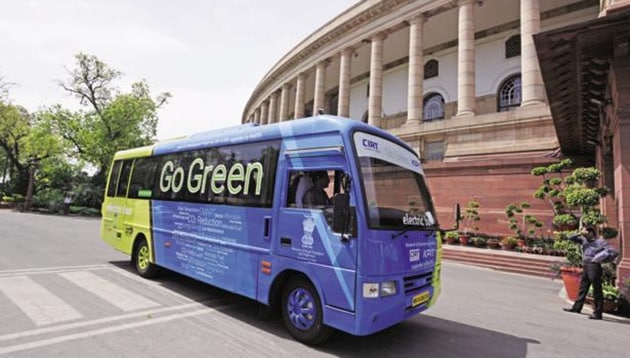To promote green energy, govt offers tax benefits on e-vehicle sales
The consumers will also have to pay more for diesel and petrol. The special additional excise duty and road and infrastructure cess will be increased by one rupee a litre each.
The government on Friday announced income tax rebates in the 2019-20 Union Budget to encourage the electric mode of transport. This is in line with its aggressive push to promote electric vehicles to reduce fuel import bills.

The consumers will also have to pay more for diesel and petrol. The special additional excise duty and road and infrastructure cess will be increased by one rupee a litre each.
In her Budget speech, finance minister Nirmala Sitharaman said the government has moved the Goods and Services (GST) Tax council to lower the rate on electric vehicles from 12% to 5%.
The Centre will also provide an additional income tax deduction of ₹1.5 lakh on the interest paid on loans taken to purchase electric vehicles. It will amount to a maximum benefits of around ₹2.5 lakh over the loan period to the taxpayers.
“Considering our large consumer base, we aim to leapfrog and envision India as a global hub of manufacturing of electric vehicles. Inclusion of solar storage batteries and charging infrastructure in the above scheme will boost our efforts,” Sitharaman said.
Niti Aayog, the government’s policy think-tank, has proposed a complete ban on all internal combustion engine powered two-wheelers and three-wheelers in India starting 2025. The automobile industry has opposed the move.
“Increasing the duties on auto parts and putting an additional cess on petrol and diesel could drive up costs of vehicles, especially where volumes are low and localisation in not viable…,” cautioned Rajan Wadhera, president of the Society of Indian Automobile Manufacturers. He added that the overall cost of operations of transport could further aggravate a slowdown in the industry.
Passenger vehicle sales have witnessed the steepest fall in 18 years as the industry faced a credit slowdown, regulation changes and a slump in the economy.
“The industry was expecting some form of a stimulus package in the Budget in line with what had been done by government during the previous two similar slowdowns. It is disappointing that the finance minister has not recognised the distress in the auto sector and not come out with any kind of support or stimulus,” added Wadhera.
Sitharaman said the Centre will launch a scheme to invite global companies through transparent competitive bidding to set up mega manufacturing plants in sunrise and advanced technology areas such as semi-conductor fabrication, solar photo voltaic cells, lithium storage batteries, solar electric charging infrastructure, etc. She said they will provide them investment-linked income tax exemptions.
The economic survey presented in Parliament on Thursday proposed to create a manufacturing hub for electric vehicles in India. “It may not be unrealistic to visualise one of India’s cities becoming the Detroit of the environmentally-friendly vehicles in the future,” it said.
The survey cited Niti Aayog and estimated that if India reached an electric vehicle sales penetration of 30% of private cars, 70% of commercial vehicles, 40% of buses and 80% of two-and three-wheelers by 2030, the country can save 846 million tonnes of net carbon dioxide emissions. It can also save 474 million tonnes of oil equivalent, it added.
Road transport accounts for around 90% of the total emissions in the transport sector. It is the second biggest contributor to India’s carbon emissions.
Sitharaman said the Centre’s vision for the next decade included a “pollution free India with green mother earth and blue skies”.
Phase-II of the Centre’s Faster Adoption and Manufacturing of Hybrid and Electric Vehicles Scheme encourages faster adoption of electric vehicles. It offers an upfront incentive on the purchase of electric vehicles and also by establishing the necessary charging infrastructure for them.
Only advanced battery and registered e-vehicles will be incentivised under the scheme with greater emphasis on providing affordable and environment-friendly public transportation options for the common man, Sitharaman noted in the Budget speech.
Deloitte India partner Vishwas Udgirkar said the masses have until now stayed away from owning electric vehicles. He added the Budget has packaged a set of lucrative incentives including additional income tax deduction on interest paid on loans and lower GST rates. “This will certainly entice many to adopt these environment-friendly vehicles, enabling the government to reduce its import bill as well as achieve its climate change commitment.”
“While these are good initiatives to give a push to adoption of electric mobility, there is still a gap in the price premium for electric vehicles, which can be gradually reduced through technology advancements and localisation in the manufacturing,” said Pranavant, partner, Deloitte India, a professional services firm.
.



